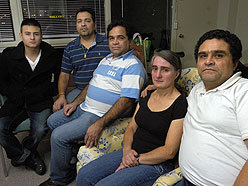Londombia no more? Dozens of Colombian families in London living in fear over threat of deportation
By JENNIFER O’BRIEN, The London Free Press, January 7 2011
For more than a decade, London has been the go-to spot for Colombian refugee claimants who have enriched the city they coined “Londombia†with their language, culture and food.
But suddenly the fate of Londombia has been thrown into question after a spate of rejections by Canada’s Immigration and Refugee Board that has left at least 48 Colombian families in London facing deportation.
The dramatic decline in acceptance rates for Colombian refugee claimants has refugee advocates and at least one London lawyer concerned lives could be in danger because of a political will to see Colombia as being safer than it actually is.
“It’s ridiculous. I’ve filed a complaint (with the IRB),†said immigration lawyer Michael Loebach.
“From one judge I’ve had 23 of 24 decisions rejected. I don’t have 24 liars in a row in my office, my acceptance rate is fine, in line or better than others. So why do I have a judge saying all my clients are liars?
“It’s really infuriating.â€
Colombia remains on Canada’s list of top 10 source countries for refugees. For the last 10 years, the acceptance rates for Colombian refugee claimants has hovered between 75 and 83%.
In 2010, the rate dropped to 53%, meaning almost half the claimants were denied. Also last year, a free trade agreement between Colombia and Canada came into effect, putting Ottawa under the microscope of advocacy groups including Human Rights Watch.
“There has been a dramatic decline in acceptance rates of Colombians,†said Janet Dench of the Canadian Council for Refugees.
“There has been a propaganda push to say the war is over and that there may be human rights abuses but they weren’t what they were in the past,†she said.
Observers who have been to Colombia report there’s a political will to put out the message conditions have improved, “but it isn’t necessarily the full picture . . . and it leaves individuals who may be at risk in a very bad situation,†Dench said.
The council doesn’t get involved in individual cases, she said, but is looking into the files of the families facing deportation to see if it can help.
Colombians are still flocking to London, said Sandra Pineda, who is also from that country originally.
“In the last year, there have still been many people coming and getting set up and working even though they are not settled. They are studying in schools and so on,†said Pineda, a mortgage consultant.
Community members say there are as many as 15,000 Colombians in London and their presence has contributed to a changing landscapes of Spanish businesses and Latin American style restaurants.
In fact, the boom that started in the late 1990s contributed to a startling census revelation that Spanish had overtaken French in London as the second most popular mother tongue in London, after English.
“London is still one of the favourite places for Colombians,†said Pineda. “There are so many people (who have been declined) and they are very concerned,†she said. “They are not in Colombia because of security reasons.â€
Dench and several others interviewed by The Free Press this week noted the decline in acceptance rates correlates with the timing of a Canada-Colombia free trade agreement that became law in June 2010, despite criticism over the latter country’s human rights records.
“There have been human rights abuses for many, many years, and they have been gross and generalized,†Dench said. “You have to be very conscious of the possibilities of people being indirectly influenced as a consequence of free trade.â€
In response to questions from the Free Press, a spokesperson from the refugee board stated each case is considered on its own merits and facts and that individual board members (known as judges) are independent in their decision making. “
“As such, statistics on the individual acceptance and rejection rates . . . cannot be used to draw conclusions or inferences,†said Melissa Anderson in an email.
“Acceptance rates may change over time for any number of reasons,†the email stated.
Last year, Human Rights Watch reported paramilitary groups were still active in Colombia, though the government claimed they had been disbanded for years.
In July, the UN criticized the country’s lack of progress in demobilizing illegal armed group such as the Revolutionary Armed Forces of Colombia (FARC).
Considered a terrorist organization by many countries, FARC was established in the early 1960s as a peasant uprising guerrilla movement. FARC is known for using extortion and kidnapping to fund its missions. Many Colombian immigrants claim to have fled because of threats or violence from FARC.
“Based on experts, the IRB has always assumed that people who have been threatened by FARC are not safe in Colombia, but suddenly they are assuming other positions, and in my mind it is traced to the fact that Colombia and Canada signed a free trade agreement,†German Gutierrez said.
Gutierrez is a professor at Fanshawe College and member of the London Middlesex Local Integration Plan Council that focuses on the civic engagement of immigrant communities.
“It’s an unfortunate twist of fate for people who continue to arrive with the same arguments as before, and you see denial upon denial.â€
E-mail jennifer.obrien@sunmedia.ca, or follow obrienatlfpress on Twitter.




